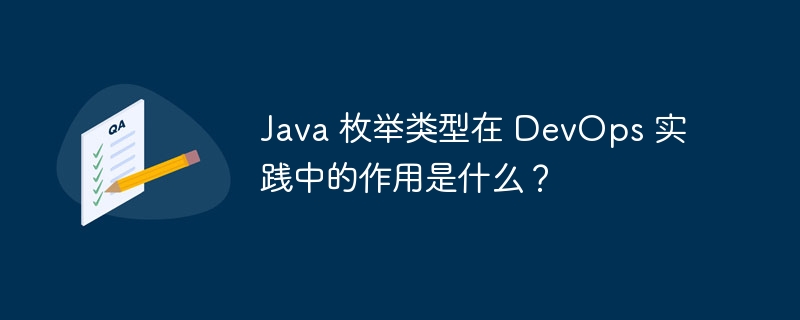
Java enum types have the following advantages in DevOps practice: Enhanced code readability: Possible values are clearly specified, improving understanding. Promote type safety: Enforce type safety and prevent invalid values from entering the system. Optimize process automation: Provide predefined options to reduce the need for manual entry. Simplify configuration management: Represent configuration options to improve predictability and maintainability.

In DevOps practice, Java enumeration types provide many advantages that help simplify tasks and Improve efficiency.
What are Java enumeration types?
An enumeration type is essentially a fixed collection of constants used to represent a limited, related set of values. In Java, create an enumeration type using the enum keyword as follows:
enum State {
NEW,
IN_PROGRESS,
COMPLETED,
ERROR
}Advantages of DevOps in Practice
The enumeration type is easy to understand and use because it clearly specifies the possible values through named constants. This helps improve code readability and reduces the chance of misinterpretation.
The enumeration type enforces type safety because it only allows the use of values within a limited range. This helps prevent invalid values from entering the system, making your code more robust.
In DevOps practice, process automation is crucial. The enumeration type can simplify automation scripts because it provides predefined options, reducing the need for manual entry.
Enumeration types can help manage complex configurations. They can represent configuration options such as environment variables or release versions, making configuration management more predictable and maintainable.
Practical case
Use enumeration types to indicate release status:
enum ReleaseStatus {
PLANNED,
IN_PROGRESS,
RELEASED,
ABORTED
}
// 使用枚举的自动化脚本示例:
switch (releaseStatus) {
case PLANNED:
deployToTestEnvironment();
break;
case IN_PROGRESS:
monitorBuild();
break;
// ...
}Use enumeration types to configure the environment Variable:
enum Environment {
DEVELOPMENT,
TEST,
PRODUCTION
}
// 使用枚举的配置管理示例:
String environmentName = Environment.TEST.name();
String databaseUrl = getDatabaseUrl(environmentName);Through these advantages and practical cases, Java enumeration types have become an indispensable tool in DevOps practice, helping to enhance code readability, promote type safety, and optimize process automation and simplify configuration management.
The above is the detailed content of What is the role of Java enum types in DevOps practices?. For more information, please follow other related articles on the PHP Chinese website!
